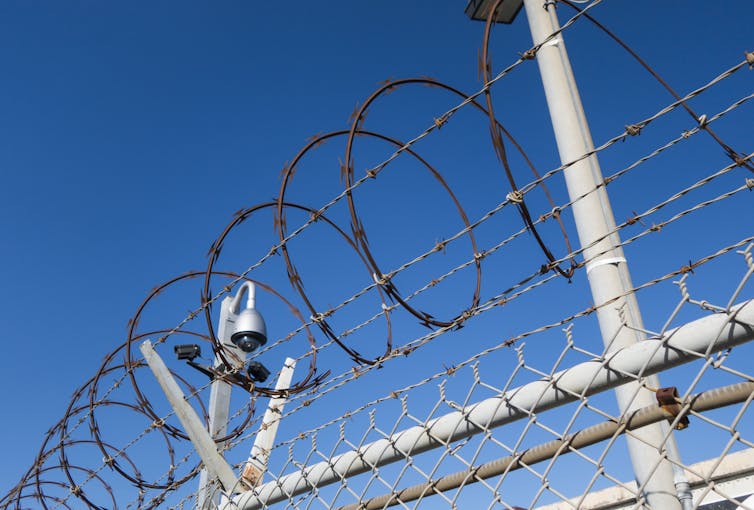Kathleen Folbigg is free. But people pardoned and exonerated of crimes face unique challenges when released from prison
- Written by Hayley Cullen, Associate lecturer, University of Newcastle

In 2003, Kathleen Folbigg was convicted of killing her four children. She has now been released from prison, 20 years later, after being pardoned by the Attorney General of New South Wales.
While Folbigg received an unconditional pardon, her conviction is not quashed and she has not yet been formally exonerated.
Few Australians have been exonerated or pardoned, so we know more from cases in the United States. Being released from prison comes with unique and significant psychological and practical challenges. Here’s what the research tells us.
Practical barriers experienced by exonerees
Typically, when someone is released from prison, they can access programs to assist with their reintegration into society. They may be eligible for halfway houses and have parole officers to help them with practical tasks, such as finding employment and seeking mental health treatment.
While exonerees have spent time in prison, they are no longer considered a (former) prisoner and may not have access to these same kinds of services.
Some states in the US now have specialised programs to assist exonerees after release. But the limited number of exoneration cases in Australia mean such services don’t exist here.
Even with assistance, exonerees often still struggle to organise their life after prison. For one, they may find it difficult to access compensation. US states have different compensation statutes that vary in terms of the amount exonerees can seek.
In Australia, exonerees have to engage in further legal proceedings to receive compensation. So far, fewer than one-third of exonerees have received compensation.
Read more: Kathleen Folbigg pardon shows Australia needs a dedicated body to investigate wrongful convictions
Exonerees may struggle to reintegrate into society due to the stigma. Research shows community members hold negative attitudes towards exonerees, including not wanting social contact with them. This can make it difficult for exonerees to form meaningful social connections.
This stigma may result in exonerees being discriminated against, denying them access to housing, employment and other crucial services.
Studies overseas have shown exonerees are less likely to receive a response back about rental listings than people who haven’t been to prison. And any responses they do receive are less friendly. In these studies, exonerees are treated similarly to ex-prisoners, despite having been proven innocent.
But limited Australian research indicates exonerees here tend to be perceived more like people who are found innocent than those found guilty. More research is needed to understand the unique challenges exonerees face here.
Psychological issues
Exonerees have levels of psychological distress comparable to other vulnerable groups such as war veterans, refugees and survivors of torture.
Unsurprisingly, they are at risk of developing clinical anxiety, depression and post-traumatic stress disorder. They may also encounter issues with substance use, sleep difficulties and strain on their relationships. They may struggle to form new connections or maintain connections from before their incarceration.
These problems are prevalent among wrongfully convicted people regardless of how long they spend in prison. In other words, even a short stint in prison while innocent may have serious and long-lasting psychological effects.
Exonerees may also struggle to adjust to a new way of life outside prison, given the rapid pace of social, technological and political change.
Not only do exonerees have to adjust to the routine of a “normal” life, they may struggle to adjust to changes they experience in their sense of self and their personality
Mothers who are wrongfully convicted
Data from the US shows one in three wrongfully convicted women were convicted of crimes that involved harming their children or those in their care. More than 70% of these convictions were based on crimes which never took place, such as mothers being accused of murdering children when their death was an accident or due to natural causes. Women are three times more likely than men to be wrongly convicted for crimes that didn’t occur.
Women who have been wrongfully convicted of murdering their children will not only endure the stigma and discrimination much like other exonerees (which could be exacerbated given the high-profile nature of their cases), but they may also be battling with the tremendous grief of losing their child. Prison can stunt the grieving process, which is a necessary psychological response to loss.
Other women who were wrongfully convicted of the murder of their children in the US, such as Michelle Murphy and Julie Rea, have reported similar difficulties in working through their grief while also experiencing post-traumatic stress disorder, difficulty finding employment, and dealing with ongoing suspicion that they are in fact guilty of the crimes they have been exonerated for.
While Folbigg’s release from prison might seem like a storybook ending, some of her challenges are just beginning. The research suggests showing Folbigg compassion and support during this time may go a long way in breaking down some of the barriers she is likely to face as she adjusts to life outside after 20 years in prison.
Authors: Hayley Cullen, Associate lecturer, University of Newcastle





